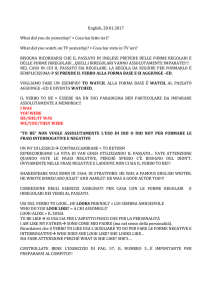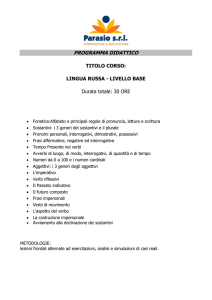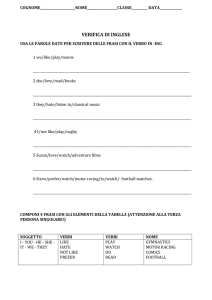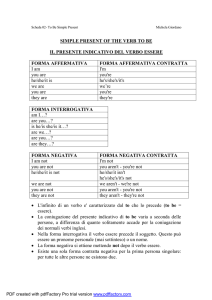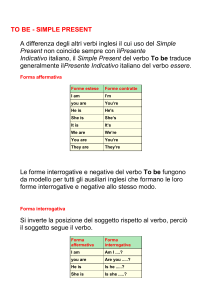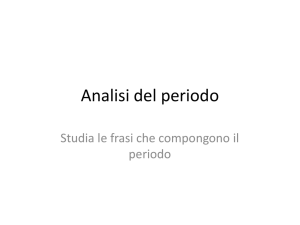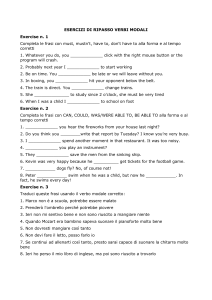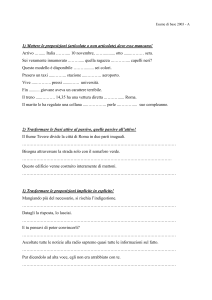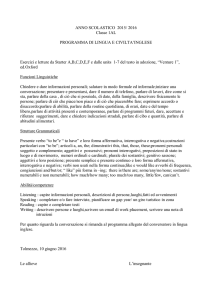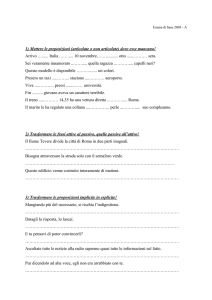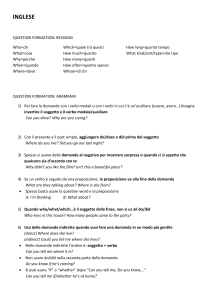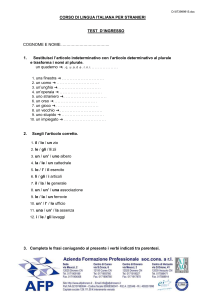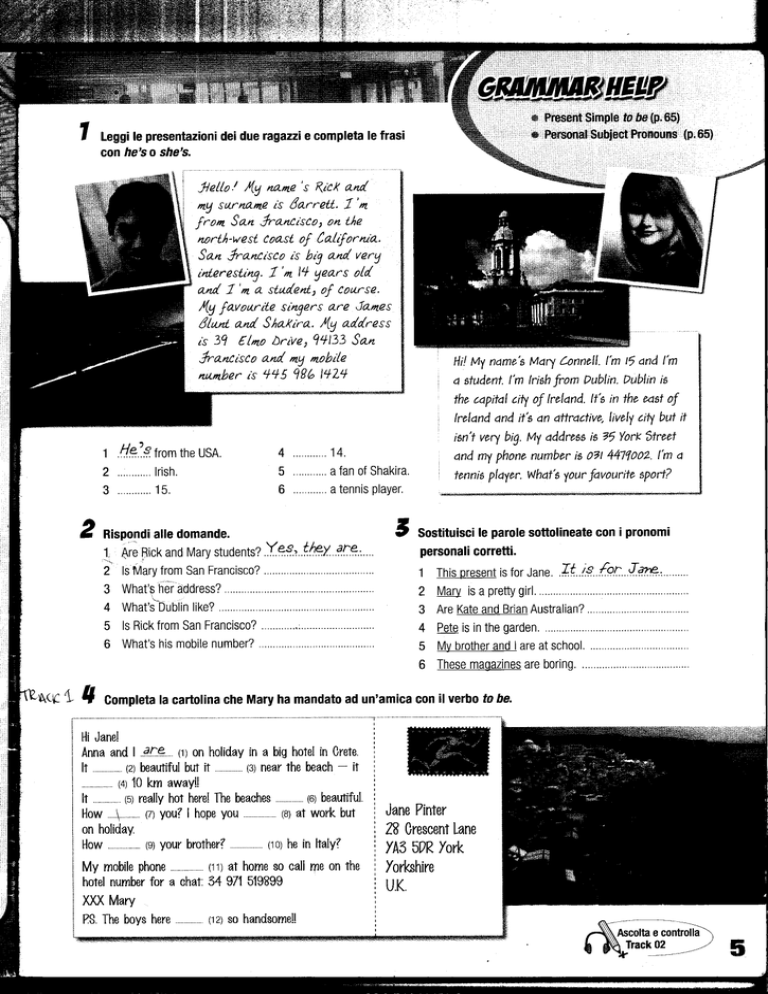
3“
'
ííS í.
1
; «!•
i
!5
E
*
grTlJf
V-
GM /u m m w
ss? 3
* Present Simple to be (p. 65)
® Personal Subject Pronouns (p. 65)
Leggi le presentazioni dei due ragazzi e completa le frasi
con he’s o she’s.
f t ello? A[y name ‘s Kick a.nd
my surname is Sarrett. 1 ' m
from. San francisco, on the
north-west Coast of Caiifornia.
San francisco is big and very
interesting, f 'm W years old.
and I'm a student, of coarse.
Ajy favoarite singers are James
Slant and ShaKira. fly address
is 3 9 Elmo drive, 9^ 133 San
francisco and my mobile
number is W S 9 9 6 I4-Z4-
Hi! My name's M ary Connell. I'm /5 and I'm
a student I'm Irish fro m Dublin. Dublin is
the capital c itf o f Ireland. It's in the east o f
Ireland and it's an attractive, lively city but it
isn't very big. My address is
from the USA.
14.
and my phone num ber is o?t 441*1002. I'm a
2
Irish.
a fan of Shakira.
tennis player. What's your favourite sport?
a tennis player.
3 ........... 15.
AFy.' 1
York Street
1
Rispondi alle domande.
Sostituisci le parole sottolineate con i pronomi
1, Are Rick and Mary students?
personali corretti.
2
Is Mary from San Francisco?...................................
1 This present is for Jane.
3
What’? her address?.................................................
2
Marv is a pretty girl..................................................
What’s Dublin lik e ? ...................................................
3
Are Kate and Brian Australian?..............................
Is Rick from San Francisco?
;.....................
4
Pete is in the garden.................................................
What’s his mobile num ber?.....................................
5
Mv brother and I are at school................................
6
These magazines are boring....................................
Completa la cartolina che Mary ha m andato ad un’amica con il verbo to be.
Hi Jane!
Anna and I
(1) on holiday in a big hotel in Crete.
It
(2) beautiful but i t
(3) near the beach - it
(4) 10 km away!!
It
(5) really hot here! The beaches
(6) beautiful.
H o w \........(7) you? I hope y o u
(8) at work but
1CA...
on holiday.
How
Jane Pinter
28 Orescent Lane
(9) yourbrother?
(io> he inItaly?
M y mobile phone........(11 )
at home so call me on the
hotel number for a chat: 3 4 971 519899
XXX M ary
RS. The boys here...... (12)
so handsome!!
XA3 5PR Xork
Xorkshire
U.K.
.
S
Rick ha mandato questa e-mail e un’immagine della sua famiglia. Leggi e sottolinea gli aggettivi possessivi.
• e «
i«*)StndNow j^StndU tcr l|)S w » u Draft ^ U n k * ^ Defetc
Mudimene]
¡¡f Signature
» ^Options *
^ jln so t * fa| Categorie»
T o :| D a v id
Subject:
My fam ily
Hi David!
This is a picture o f m y fam ily. It's a big fam ily! Tom and A nthony are m y brothers. Tom is 8 m onths
old and he's v ery lively! A nthony loves bikes. He's got 4! But o ur garage is too sm all so th e y are
alw ays in th e garden.
Look a t m y m other. She's w ith her books as usual!
W hat about me? I'm with m y favourite skateboard. We are with our dog, o f course. His nam e is Black
and he's 3 years old.
W h a t about your fam ily?
Bye!
Rick
S
Rileggi l’e-m ail e completa le frasi con le informazioni mancanti.
1 Tom and Anthony are
2
T
is eight months old.
3
Anthony’s gotfo u r ..........................
4
Rick’s mother reads a lot o f .........
Collega le frasi nelle due colonne con gli aggettivi possessivi corretti.
1
Is t h is ----------------------- ^
my
A name is Mr Kaye.
2
Good morning everyone.
our
B population is 865,263.
3
He’s a friend.
her
C book, Mr Tomlins?
4
This is a photo of me with my sister in
your
5
Mr and Mrs Hopkins are on holiday with
its
E name is Robert.
6
Turin is in Italy.
his
F bedroom.
7
She’s Claire and he’s
their
G children Sarah and Hannah.
—'
D boyfriend, Andrew.
8 Inserisci a, an, the.
1 I’m
2
teacher.
5
tennis match is on Sunday.
3
He i s
famous footballer.
4
Excuse me. Where i s
train station?
girls in your class are beautiful!
6
This i s
7
Friday i s
8
Is s h e
American film.
fantastic day!
engineer o r
architect?
Ascolta e
controlla
^ Track 03
GuummHtm
$ Possessive adjectives (p. 65)
* Articles (p. 65)
# Plurals (p. 65)
% Question words (p. 65)
Qual è il plurale di queste parole? Scrivilo nella colonna appropriata.
trolley
knife
g
dish g
child g
g
§ tooth g city g person g
g film g secretary g kiss g
boy g toy g wife g leaf g foot g
play g woman g class g video g
glass
bottle
+S
+ ES
g
lady
match
stereo
bus
g
g
g
g
church
potato
box
man
window
+ IES
+ VES
IRREGOLARE
tro lle y s
!
i
................................................
i
!
IO
1
i
Claudio è un ragazzo italiano che vuole iscriversi alla Kingsway School di York. Completa le domande con
l’interrogativo corretto. Poi abbina le domande alle risposte.
1
W hat
□
A
I’m Italian. From Brescia.
2
............... ...,’s your surname?
□
B
It's Via Cardano 57.
3
............... ....are you from?
□
C
It’s 25010.
4
............... ....’s your address?
□
D
I’m a student.
5
............... ...,’s your postcode?
□
E
It’s 030 67021.
6
............... ...,'s your phone number?
□
F
Volta.
7
............... ....are you?
□
G Claudio.
8
............... ...,’s your job?
□
H
your name?
I’m 17.
11 Completa il modulo di iscrizione alla scuola con le informazioni richieste.
K$E KINGSWAY SCHOOL OF ENGLISH
First name
Surname ........ ...............
A ddress................................................................... Town,
Postcode............................. Country...............................
Phone number....................................................................
Jo b ........................................................................... A g e ....
Ascolta e
controlla
Track 04
Quanto sono sane le tue abitudini alim entari? Rispondi a queste domande e lo scoprirai.
©
Do you alw ays have breakfast in the morning?
How often do you eat sw eets and snacks
before or after school?
□
□
□
□
□
□
□
□
Never 5
Once or twice a week
[T]
Three or more times a week
W hat type o f food do you eat at school?
□
□
□
Piz2a, crisps [Ô]
Fruit, yogurt [5 ]
Chocolate cakes [Ô]
Every day [o]
Now add up the points in brackets
and check your score.
Do you ever have fa st food at hom e?
1 4 - 1 7
Yes, every day [o]
C o n g ra tu la tio n s ! •
Y o u 're s u p e r h e a lth y
1 0 - 1 4
Yes. sometimes l~T|
W e ll d o n e . •
Y o u h a v e a b a la n c e d d ie t
5 - 1 0
Rarely
B e c a re fu l! •
Y o u could e a t b e tte r
0 - 5
No, never
Y o u 're a d is a s te r! •
Traduci gli avverbi e le espressioni di frequenza fra parentesi e m ettile al posto corretto nelle frasi.
1
Roger has a bath. (ogni ser a) .
.
. < ? . . Ò..£¥£!?y..Q y & y ttg .-.........................................................
Sheila watches TV after lunch, (m a i)..........................................................................................................................
They go to the mountains, (tre volte a ll’anno)............................................................................................................
Bob Is tired In the afternoon, (spesso)........................................................................................................................
We go to the cinema on Saturday night. (qualche volta)...........................................................................................
Scrivi alcune frasi usando How often, Do/Does ... ever, e i suggerimenti dati.
HOW OFTEN
1 you/meet frie n d s
DO/DOES..... EVER
....................................... ?
4 Luke/go to bed la te .....................................................?
2 Paul/read a b o o k ............................................... ?
5 Linda/go to the d is c o ..................................................?
3 Kate/have coffee.................................................?
6 you/write e-m ails.........................................................?
Completa le frasi con le preposizioni di tempo in, on, at.
1
I go to the g y m
because
2
My birthday i s
Monday a n d
Thursday
summer I go to the swimming p o o l
June 20th. On that day I get up e a rly
3 .0 0
the afternoon. I only g o
winter
the evening.
the morning, usually
7.00 because I’m
very excited.
3
the weekend we relax
meet frie n d s;
4
Saturday evening we always go to the pub a n d
the evening we stay at home.
Christmas we like seeing all our relatives.
Sunday afternoon we
Present Simple of to be and Personal Subject Pronouns
Affirmative
I’m (am)
You’re (are)
He’s/She’s/lt’s (Is)
We’re (are)
You’re (are)
They’re (are)
Negative
lo sono
Tu sei
Egli, Ella, Esso/a è
Noi siamo
Voi siete
Essi sono
Short answers - affirmative
Yes,
I am
you are
he/she/it is
we are
you are
they are
I’m not (am not)
You aren’t (are not)
He/She/It isn’t (is not)
We aren’t (are not)
You aren’t (are not)
They aren’t (are not)
Interrogative
Am 1?
Are you?
Is he/she/it?
Are we?
Are you?
Are they?
Short answers - negative
No,
I’m not
you aren’t (’re not)
he/she/it isn’t (’s not)
we aren’t (’re not)
you aren’t (‘re not)
they aren’t (’re not)
Possessive Adjectives
Possessive Pronouns
my
your
his
her
its
our
your
their
mine
yours
his
hers
il mio/la mia, i miei/le mie
il tuo/la tua, i tuoi/le tue
il suo/la sua, i suoi/le sue (di lui)
il suo/la sua, i suoi/le sue (di lei)
ours
yours
theirs
il nostro/la nostra, i nostri/le nostre
il vostro/la vostra, i vostri/le vostre
i /le loro
mìo/mìa, miei/mie
tuo/tua, tuoi/tue
suo/sua, suoi/sue (di lui)
suo/sua, suoi/sue (di lei)
suo/sua, suoi/sue (di esso/a)
nostro/nostra, nostri/nostre
vostro/vostra, vostri/vostre
loro
Demonstratives
Question words
this
that
these
those
what
where
when
who
whose
how old
how much
how many
how often
why
questo/a
quello/a
questi/e
quelli/e
Plurals
• Normalmente -► sostantivo singolare +s
• Sostantivi terminanti In -y preceduta da vocale —►+s
preceduta da consonante —►-y- +ies
• Sostantivi terminanti in -s, -ss, -sh, -eh, -x, -o - > +es
• Sostantivi terminanti in -f o -fe -► - + , --fé- +ves
• Sostantivi con plurale irregolare:
child bambino, figlio —► children
foot
piede -► feet
man uomo -► men
person persona -► people
tooth dente -► teeth
woman donna —► women
quale/che cosa
dove
quando
chi
di chi
quanti anni
quanto/a
quanti/e
quanto spesso/quante volte/con che frequenza
perché (in frasi interrogative)
Articles
Determinativo
the = il, lo, la, i, gli, le
Indeterminativo a/an = un, uno/a
uso a si usa davanti a: consonante
h aspirata
u e eu pronunciate /ju /
an si usa davanti a: vocale
h muta (hour, honest, honour, heir)
65
Possessive’s
Esprime una relazione di possesso quando il possessore è una persona
si f o r m a
possessore + ’s cosa posseduta Mary’s house
come
Possessore singolare terminante in -s ■ ’s
Possessore plurale regolare -► ’
Possessore plurale irregolare -► ’s
Più di un possessore -► ’s dopo l’ultimo
James’s house
The boys’ house
The children’s house
John and Mary’s house
Prepositions of place
at
in
on
over
above
under
below
a (luogo specifico o indirizzo)
in
su/sopra (quando c’è contatto)
su/sopra (quando ha il senso di “copertura”)
su/sopra (quando non c ’è contatto)
sotto
sotto/al di sotto
near
next to
between
among
inside
outside
against
vicino (a)
vicino/accanto (a)
tra/fra (fra due)
tra/fra (fra molti)
dentro
fuori
contro
opposite
in front of
behind
on the right (of)
on the left (of)
on/at the corner (of)
in the centre (of)
di fronte (a)
davanti (a)
dietro (a)
a destra (di)
a sinistra (di)
all'angolo (di)
al centro (di)
Prepositions of movement
from
towards
past
over
da
verso
oltre
sopra, al di là
through
across
straight on
along/down
attraverso (un luogo)
attraverso (una superficie)
diritto
lungo
under
into
up
around
sotto
in
su
attorno
There is - There are
Singular
i Plural
I
Affirmative
! There is
C'è
i There are
Ci sono
i Singular
| Plural
>
Short answers - affirmative
i Yes, there is
j Yes, there are
I
Negative
! There isn’t
Non c'è
i There aren’t Non ci sono
i
Short answers - negative
\ No, there isn’t
I No, there aren’t
uso There is/is there?/there isn’t + a/an + sostantivo
There are/are there?/there aren’t + una quantità definita
+ una quantità definita + sostantivo plurale
+ una quantità indefinita + sostantivo plurale
i
Interrogative
! Is there...?
C’è...?
: Are there...?
Ci sono...?
i
I
There are two.
There are two windows.
There are some windows.
Some/any + countable and uncountable nouns
Sostantivi numerabili = quelli che possono essere contati e quindi avere il singolare e il plurale: A book, Two books
Sostantivi non numerabili = quelli che non possono essere contati e quindi di norma non hanno il plurale: Milk.
Some/any del, dello/a, degii, delle esprimono una quantità indefinita.
uso Some si usa in frasi affermative e in frasi interrogative quando esprimono offerta e richiesta.
There is some coffee.
Would you like some coffee?
CanIhavesome coffee?
Any si usa in frasi interrogative (che non esprimono offerta e richiesta) e negative.
Is there any coffee?
There isn’t any coffee.
I sostantivi numerabili possono essere usati con some/any solo con la forma plurale del verbo: There are some apples.
I sostantivi non numerabili possono essere usati con some/any solo con la forma singolare del verbo: There's some coffee.
66
Frequency Adverbs and Expressions
Adverbs
always
sempre
usually
disolito
never
mai (in frasi affermative ma per
sometimes qualche volta
seldom/rarely raramente
esprimere un concetto negativo)
ever
mai (in frasi interrogative)
often
spesso
hardly ever quasi mai (in frasi affermative)
uso Gli avverbi di frequenza precedono sempre il verbo, ad eccezione di sometimes che può andare anche all’inizio di frase.
Solo con il verbo to be e con i modali (can), devono essere collocati dopo il verbo.
Expressions
every (day/w'eek/month/year)
once/twice/three/etc. times a (day/week/etc.)
ogni (giomo/settimana/mese/anno)
una volta/due volte/tre/ecc. volte al giorno/alla settimana/ecc.
uso Di solito si collocano alla fine della frase.
Like e verbi di preferenza
Affirmative
Negative
I/You/We/They like
He/She/It likes
Yes,
Short answers - affirmative
l/you/we/they do
he/she/itdoes
Do l/you/we/they like?
Does he/she/it like?
COSTRUZIONE
A Marco
piace
complemento di termine
Short answers - negative
l/you/we/they don’t
he/she/it doesn’t
No,
Interrogative
I/You/We/They don’t like
He/She/It doesn’t like
Anna
soggetto
i
i
soggetto
likes
Marco
oggetto
Anna
Altri verbi di preferenza
love amare
don’t mind non dispiacere
prefer preferire
hate odiare
can’t stand non sopportare
uso Quando questi verbi sono seguiti, in italiano, da un infinito, in inglese esso si esprime con la forma in -ing
I like singing.
per aggiungere -ing
Verbi terminanti in -y -► conservano la y
playing, studying
Verbi terminanti in -e muta - * eliminano la e
making
Verbi terminanti in -ie —►cambiano -ie in y
dying
Verbi terminanti in -I (in British English soltanto) -► raddoppiano la I
travelling
Verbi monosillabi e bisillabi con ultima sillaba accentata, terminanti con consonante -► raddoppiano la consonante putting, preferring
r e g o le o r t o g r a f ic h e
•
•
•
•
•
Avverbi/espressioni spesso usate con to like
quite
very much/a lot
at all
abbastanza
molto
per niente/affatto
uso
uso
uso
Si colloca prima del verbo.
Si colloca dopo l’oggetto.
Si usa in frase negativa e si colloca dopo l’oggetto.
I quite like him.
I like him very much/a lot.
I don’t like him at all!
Personal Object Pronouns
me
you
me
te
him
her
it
lui
lei
esso
uso I pronomi personali seguono sempre il verbo o una preposizione:
68
us
noi
you
voi
them loro
I love him.
rii look for them.

